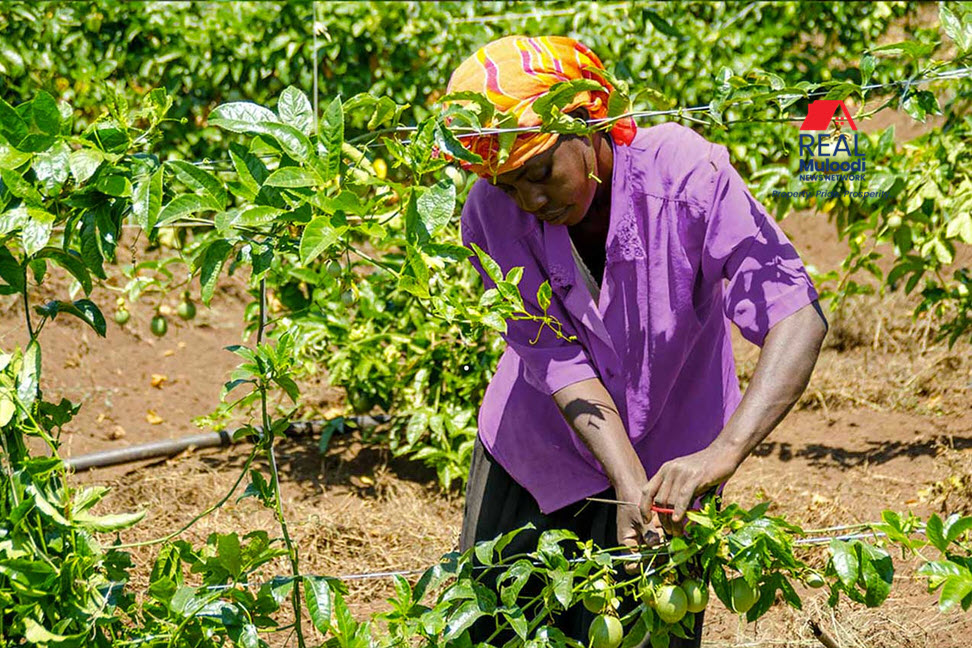UGANDA, Pader | Real Muloodi News | Amid the Covid-19 pandemic, some Ugandans have turned to money lenders to acquire loans using land as collateral. Unable to earn and pay for their loan instalment, they face eviction from their land. Money lenders are now taking advantage of the ongoing pandemic.
In March 2020, when Doreen Achiro, 41, was chased out of her matrimonial home by her husband, she took her four children and started a new life.
She started working as a casual labourer selling fruit at a local market. When she discovered her neighbour was selling a one-acre plot of land in Kinene village, northern Uganda, she jumped at the opportunity to purchase it.
She paid half of the money upfront for the land and agreed to pay the remainder in instalments in a year. Achiro and her children moved to make a new home on the land and also began farming.
In May, Achiro took out a loan of USh1.3 million, using her land as collateral. The loan carried an interest rate of 20% with weekly instalments. The final instalment was due one year from the loan’s inception.
Achiro had given her family a home. Yet, a year later, she is struggling once more. The lockdown restrictions made it difficult for Achiro to sell her goods in the market. She still owed the money lender a sum of USh780 000. Even when the loan payment terms had expired four months ago, the interest continued to increase.
Unfortunately, Achiro could not finish paying for the land, and the owner was threatening to evict her.
“He told me I failed to pay on time, saying that he had already sold the same land to someone else. When I asked him to refund my money, he said; ‘I don’t know what you are talking about. They tricked me into buying air,” Achiro narrates.
Achiro did not have any written documents proving ownership of the land. She tried to consult with village leaders who refused to help her because she didn’t have any money to pay them.
“I am struggling to feed my family, and what I cultivated on that land will be taken away,” Achiro says. “It will all be for nothing.”
Achiro is not the only victim. Many people in rural communities who took out loans during the pandemic have lost their property after defaulting.
When Sharon Ayaa, a 37-year-old single mother, lost her job during the first lockdown in July 2020, she took out a loan of USh3 million, using her two-acre piece of land as collateral.
“I used some of the money to stock food in our house,” Sharon says. “I used some of it to pay up some hospital bills for my mother… and I used some to start up a business of selling cakes,” Sharon said.
The cake business kept her going for a while. However, when she missed some loan repayments, the moneylender seized her land.
“They came to my house very early in the morning and told me that ‘your time is up. At first, I told them to give me time to pay, but the loan officer refused to listen. I was scared, and I gave in,” Sharon narrates.
During the COVID-19 pandemic, stories like Achiro’s and Ayaa’s have become common. Because of the public outcry, in April 2020, the government temporarily stopped all land transactions and evictions.
Despite the government’s intervention, many microfinance lenders continue to ignore the directive. According to Nwoya district chairperson Emmanuel Orach, about 30 locals in the district were tricked into selling their land or lost their land because of loans.
“Many people survive on agriculture, and when they lose their land, the situation worsens. “What we have done so far is to meet officials from the 15 credit facilities and asked them to give more time to the people to pay their loans because of the pandemic. We are waiting to hear from them,” Orach says.
“We have a complaints handling mechanism which coordinates with local leaders at grassroots to handle cases of people who are being forced to pay money during this time,” says Edward Bindhe, UMRA communications officer. “After finding out that the complaints are genuine, we may fine or revoke the licenses of such institutions depending on the nature of the crime.”
Some lenders are following the government’s lead and attempting to assist their consumers during this challenging time. The Northern Uganda Women Development Fund, for example, claims to have met with loanees to help them plan rather than demand payments.
“We meet with our borrowers and look at the situation of their business and also make a projection of when they will be able to pay back without putting pressure on them during this time,” says Nancy Anena, a loans officer with the fund.
Other lenders argue that a more patient approach isn’t workable. Some financial firms have warned African Arguments that they are trying to stay in business since loan payments have slowed during the outbreak.
“We tried being patient in the first lockdown last year but it’s too much for us as well,” says one moneylender who asked to remain anonymous. “If we wait, what will our families eat?”
This issue is especially pressing for people like Achiro and Ayaa, whose livelihoods are uncertain and whose houses have been washed away.
READ MORE LIKE THIS:



